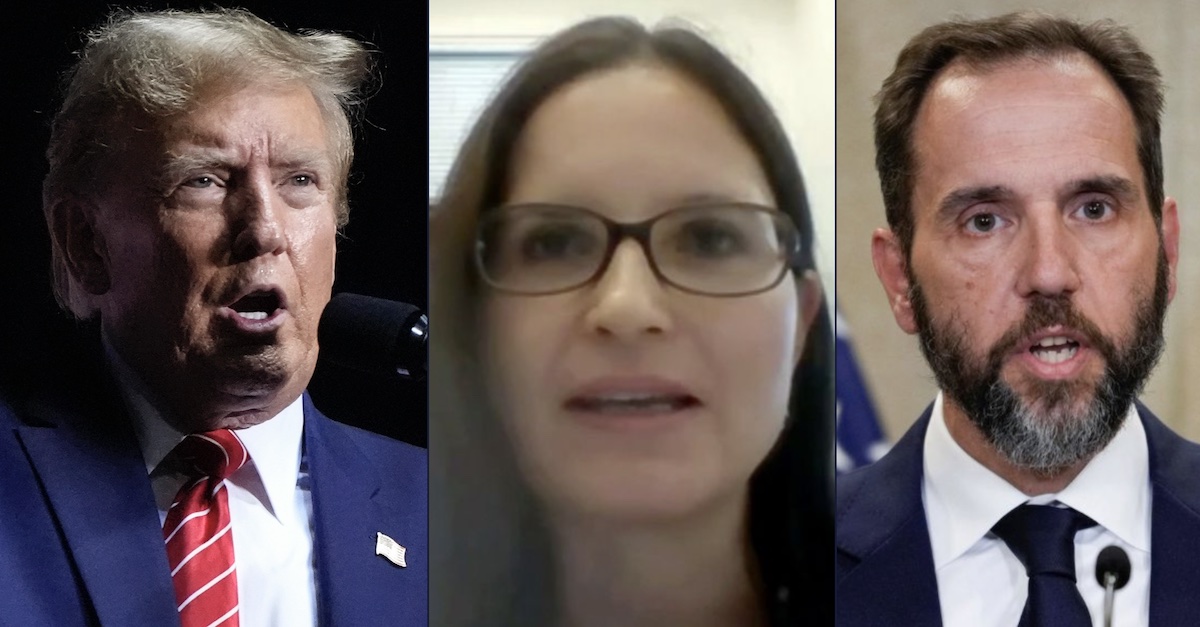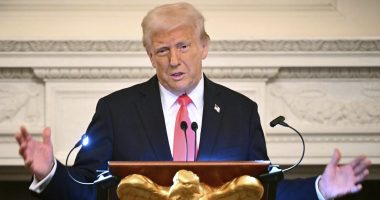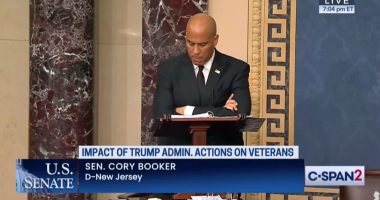
Left: Donald Trump (AP Photo/Mike Stewart), File); Center: U.S. District Judge Aileen Cannon (U.S. Senate); Right: Special counsel Jack Smith (AP Photo/J. Scott Applewhite, File)
The judge overseeing the Mar-a-Lago documents case has instructed the parties to prepare for the public release of two long-sealed defense motions as well as the potential release of various other filings concerning certain “grand jury matters” and “materials.”
In a little-noticed order released late Thursday, U.S. District Judge Aileen Cannon formalized the results of a hearing held the day before that concerned an unidentified series of older and more recent, sealed government filings and two specific defense motions.
“Among other topics, the parties presented argument on the need for continued sealing of certain grand jury materials associated with Defendant Trump’s two undocketed motions: (1) Motion for Relief Relating to the Mar-a-Lago Raid and Unlawful Piercing of the Attorney-Client Privilege; and (2) Motion to Dismiss Based on Prosecutorial Misconduct and Due Process Violations,” the order reads.
As previously reported, the motion seeking relief over the raid of the 45th president’s Palm Beach-based quasi-home-and-business alleges the government unlawfully obtained evidence in violation of the attorney-client privilege and seeks either suppression of such evidence or dismissal of the indictment due to alleged prejudice.
The motion to dismiss was filed — along with four other motions to dismiss filed publicly — on Feb. 22 and alleges the government engaged in pre-indictment delay and grand jury abuses.
Those two motions likely contain a significant amount of information the government would rather not be made public.
During the May 8 hearing, prosecutors on the team led by special counsel Jack Smith made arguments related to the government’s proposed redactions in order for the motions to be released publicly.
The defense is now being directed to suggest their own redactions.
More Law&Crime coverage: The Trump Docket: Mar-a-Lago judge puts Jack Smith on the ropes with hearing schedule as ex-president receives reprieve
“Defendant Trump shall submit under seal, but not ex parte, his current position on the sealing of his two undocketed motions, the associated responses and replies, and all accompanying exhibits,” the court’s order reads. “This submission shall consist of proposed ‘red box’ redactions to the above-mentioned filings, exhibit by exhibit, as well as contain a chart/list indicating the bases for all proposed redactions. Defendant Trump shall review the Special Counsel’s proposed ‘red box’ redactions when conducting this exercise.”
Both the government and the defense have until May 16 to issue their first set of proposed changes related to the motions.
In each instance, “the names of potential witnesses or clearly identifying information, ancillary names,” and personally identifiable information should be redacted, the court further ordered.
More Law&Crime coverage: ‘It’s becoming a problem every single day:’ Trump hush-money judge tells prosecutors Cohen should ‘refrain’ from talking about trial on TikTok
The order concerns eight numbered — but otherwise unidentified — docket entries which were also discussed during the hearing.
In the original order setting the hearing, Cannon suggested at least one of those documents was filed under seal by the government.
While the exact nature of those documents is necessarily being kept under wraps, for now, the judge previously described three of those documents in general terms as “specific grand jury material implicated in this proceeding in light of the Special Counsel’s sealed status report” as well as “updates to pending disclosure proceedings in the U.S. District Court for the District of Columbia.”
Regarding those other documents, the court gave the government and the defense until May 20 to “confer and jointly file a status report presenting their respective positions on continued sealing.”
More Law&Crime coverage: ‘Safety and privacy are paramount’: Jack Smith implores Mar-a-Lago judge to redact defense motions because they contain witness names and sealed grand jury information
The special counsel’s office has fought vociferously to keep certain information in the case under lock and key. Cannon has been heavily criticized by the prosecution in numerous filings — and by a steady stream of legal and political pundits in the media — for tentative decisions that allowed publishing witnesses’ names.
In early April, Cannon begrudgingly reversed herself.
In an order heaping scorn on the government’s command of the law, the judge agreed to keep secret the names of potential government witnesses. And, while managing to make her displeasure palpable in her order that largely granted the government’s requests, as well as, a few defense requests, Cannon set the stage for potentially revisiting the issue in the future — should the matter ever come up and then come down differently in the relevant federal court of appeals.
Have a tip we should know? [email protected]








